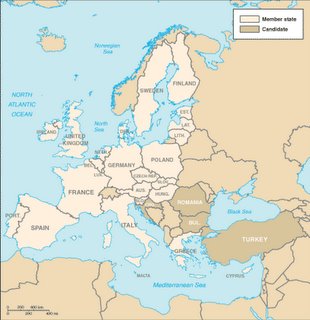Alexander's Dream Lives On
 Since the time of Alexander the Great, who marched east into Asia after uniting the then civilised Europeans [ie the Greek world], Europe has always looked towards a unity amongst its people. Unlike Alexander the Great and his vision of "one world, one people", attempts to unite Europe have been through one race and its beliefs dominating the others.
Since the time of Alexander the Great, who marched east into Asia after uniting the then civilised Europeans [ie the Greek world], Europe has always looked towards a unity amongst its people. Unlike Alexander the Great and his vision of "one world, one people", attempts to unite Europe have been through one race and its beliefs dominating the others.Whether it was Napoleon or Hitler, whether it was through political ideology [Communism] or religion [Christianity or Islam], the past attempts to unite Europe has always been at the expense of the various races within the continent.
Alexander the Great's vision was to unite the then known world under one ruler. Nothing different from any other conqueror before or after him. What was different was his belief that by inter-marrying the various races, one would eventually create one race. By inter-marrying and by blending the best [and worst] of each culture into one huge melting pot, Alexander the Great envisaged what was loosely labelled as "one world, one people". His vision, to some extent, died with his own death and the lack of a nominated successor to take over.
However, even though his empire collapsed as a single entity, his dream continued to live on. First through the succeeding four empires that emerged, but also through the eventual rise of the Roman Empire and its successor the Byzantine Empire. What has been labelled as "Hellenistic" by historians, was the ongoing vision of merging the Greek culture and beliefs with those of the locals [Egyptians, Indians, Persians etc]. Although officially, the Hellenistic Era ended with the Roman conquest of Egypt in 30BC, the Hellenistic philsophy survived through the rise and fall of the Roman and Byzantine empires in 1453AD - nearly 1800 years after Alexander the Great's reign.
 Today, the vision of Alexander the Great's "one world, one people", has emerged in what is known as the European Union. From the debris left behind from World War 2, six countries founded the European Coal and Steel Community in 1952. Initially just a trade body, it transformed itself into the European Economic Community in 1958, and finally into the European Union in 1993. In 2004, the European Union encompassed 25 countries with a population of over 450 million [more than the USA and Russian populations combined]. A further four countries are going through the formalities of becoming members of the European Union, and several others are also waiting for membership.
Today, the vision of Alexander the Great's "one world, one people", has emerged in what is known as the European Union. From the debris left behind from World War 2, six countries founded the European Coal and Steel Community in 1952. Initially just a trade body, it transformed itself into the European Economic Community in 1958, and finally into the European Union in 1993. In 2004, the European Union encompassed 25 countries with a population of over 450 million [more than the USA and Russian populations combined]. A further four countries are going through the formalities of becoming members of the European Union, and several others are also waiting for membership.If all the potential new members become part of the European Union, the membership by 2020 would have ballooned to over 33 nations with a population in excess of 600 million. Its borders stretching from Portugal in the west, to Sweden in the north, Cyprus in the south, Ukraine and Turkey in the east.
Whereas Alexander the Great attempted to create the "one world, one people" via conquest, the European Union is achieving this through democratic processes. Where Greek language and culture was used as the central pivotal focus of Alexander's dream, the European Union is a truly mixed cultural and racial group where no one culture is predominant.
Alexander the Great's attempt to unite the world begun at the age of 20 when he became King of Macedonia and died in Babylon in 323BC at the tender age of 33. The path of unity of Europe has taken a lot longer, over half a century, and still evolving.
The road to a united Europe is a long and tedious one, filled with progress and setbacks. But the unity is one of choice rather than force. Whereever the road may lead for the European Union in the future, one thing is for certain. Whether as individuals we agree or disagree with the development of the European Union, is irrelevant. Peace and prosperity can be achieved in one of two ways - through co-operation or through conquest.
Alexander the Great's vision of "one world, one people" is coming to fruitition.
James

0 Comments:
Post a Comment
<< Home